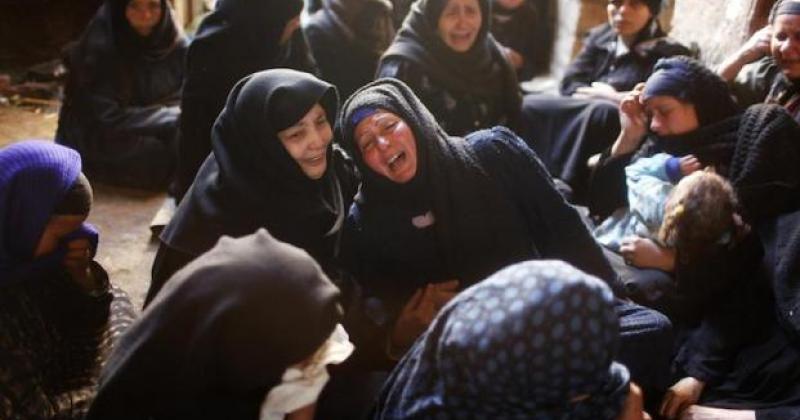The news of the beheading of 21 young Egyptian Copts by the Islamic State (IS) in Libya has plunged Egypt into sorrow and mourning. The families of those killed remain prostrate in a suffering that is even physical, comforted by their communities in prayer. Many Muslims also share in their pain. It is clear, as pointed out by many thinkers and political leaders that the events resulted in unifying the nation more strongly. Today, former judge 'Amr 'Abel al-Raziq underlines that the population is strongly united with the army in any retaliation against the ''barbarian killers' bases'' in Libya.
Public opinion in Egypt in general is strongly shocked by the Jazira TV stating that the Egyptian air strikes against Daesh in Libya made civilian and children victims. At this point, everybody around here is happy with the Qatari ambassador's departure from Cairo, though it is not clear if he was called back by his government or if he is out of Egypt for more than one month for vacation.
On the other side the prevailing feeling is one of pride mixed with sorrow mainly for the victim's families. Pride because the 21 Egyptians seen to have confronted death with courage as did the multitudinous Egyptian martyrs all along history since Pharaonic times, through Diocletianus martyrdom and Mamluks cruelty as well as that of the countries that occupied Egypt for centuries.
Since then, every Egyptian, and mainly Coptic ones, have a deeply rooted sense of martyrdom. Egyptians have been strongly religious for thousands of years and profound believers. This is even stronger in Upper Egypt and mainly in rural areas where Christian people have been confronted with many problems for more than four decades.
For weeks, the families of the victims have been considered to be ''mourning in remission'' since the pictures of their relatives wearing the orange suit of the people sentenced to death were published. They protested in front of the press union building and Saint-Mark cathedral: ''We want our children dead or alive''.
Nader Shukry one of the relatives stated last week: "The problem started on the December 31 last when 7 Egyptians were kidnapped on their way back to the homeland'. On January 3, 13 others were taken. Last August, 5 other Coptic Egyptians were kidnapped in Libya. The Foreign Ministry here was only able to deal with Libyan tribe leaders''. Shukry also states that the families representatives were not allowed to meet with the Prime minister or the minister of Foreign Affairs, or even the Minya Governor.
Bedewy Samouïl and Ibrahim 'Ayyad, each brothers of a victim, stated that all their families were living a nightmare for two months. The same with Mushrif Fawzy, a father of a victim. They have all appealed to the United Nations for a clear intervention as stated by their lawyer, Joseph Malâk.
Father Sidrac Ghâly, higoumen from Samallut bishopric, the area where the victims came from in Middle Egypt in the Minya Province, has been closely following the situation while Bishop Botros Fahîm, Catholic bishop of Minya declared three days of prayers and fasting before even learning about the victims brutal murder.
Stephanos Daoud, 60, and his wife have been weeping tears of sorrow for both their young children Bishoï, 25, and Samouïl, 22, two brothers who looked like twins who never wanted to be separated. Both father and mother were not able to follow the families to Cairo. They remained in sorrow within their village while their eldest son, Bashir, a rural farmer, came to Cairo wreaked by his total incapacity to protect his ''two inseparable brothers that even death will not divide''.
Since last Monday when news of the awful fate of the victims beheading was confirmed, the five villages have been plunged into a terrible mourning, as well as Samallout, Minya, Cairo and all of Egypt. Many families members, unable to bear the reality, fainted. In the village of Al-'Our, in Samallout, the area where most of the victims came from, their mothers and wives have suffered terribly from the shock. Nessim Gabâly, from the village, reports that Sâmeh Salâh Farouq, a widow passed out for a while holding her one year old baby.
A great number of the inhabitants have been taken to different hospitals in Samallout suffering mainly from blood pressure problems or sudden fainting.
Stephanos Daoud expressed the hope to receive the corpse of his two sons in order to allow them a proper funeral. This is the same hope for all families, but it will never be achieved since the assassins threw the bodies into the sea. While Teresa 'Ateyyât Shehâta, 60, mother of the victim Youssef Shukry Younan stated that her son was trying to get married and support his two sisters. In Matay, north of Samallout, Mounir 'Adly Saad collapsed when learning of his son Gaber's death.
Amba Paphnutios, the Coptic Orthodox bishop of Samallout decided immediately to organize prayers and masses for the victims while the neighbours have decided to put up tents in the village in order to gather the inhabitants and receive condolences.
